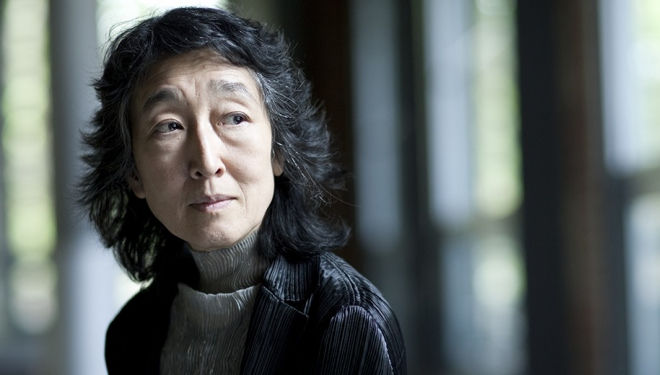
When Mitsuko Uchida plays piano, it can seem like the world has fragmented, then re-arranged itself around her. Some great musicians are renowned for intensity and tempestuousness, their ability to make audiences feel; others for their intelligence and determination to explore every facet of a piece. Uchida is the rare pianist who somehow manages to do both to the highest degree.
Born in Japan but now a UK citizen, Uchida’s 2016 recital at the Royal Festival Hall offers a chance to hear her play the classic Viennese and Germanic repertoire that she has repeatedly made her own. Her complete set of Mozart sonatas won the 1989 Gramophone Award, and releases since have been greeted with a no less acclaim. In 2009, she was anointed a Dame Commander of the Order of the British Empire.
Uchida is also known for her expertise in the Second Viennese School; in 2001, she won a second Gramophone as the soloist in Schoenberg’s Piano Concerto. Drawing on this specialism, the concert opens with Berg’s Piano Sonata (c. 1909). Although its single movement is tonal, Berg’s techniques create an acute sense of uncertainty and instability, the sound of a new, daunting century.
Afterwards, Uchida glides back a century to play Schubert, Mozart and Schumann. The former’s 4 Impromptus op. 90 (1827) represent the peak of this now-disused romantic form, where the composition has the vitality and free-flowing sense of an improvisation. The second half begins with Mozart’s late Rondo for Piano No. 3 (1787), a piece of eloquent melancholy that historians often link to the death of a close friend. The night closes with Schumann’s Piano Sonata No. 1 (1835). Dedicated to his wife Clara, Schumann’s piece is perhaps the ultimate romantic sonata; huge in scale and poetic in might, scaling its impassioned heights requires enormous energy. Uchida will surely be up to the task.
Born in Japan but now a UK citizen, Uchida’s 2016 recital at the Royal Festival Hall offers a chance to hear her play the classic Viennese and Germanic repertoire that she has repeatedly made her own. Her complete set of Mozart sonatas won the 1989 Gramophone Award, and releases since have been greeted with a no less acclaim. In 2009, she was anointed a Dame Commander of the Order of the British Empire.
Uchida is also known for her expertise in the Second Viennese School; in 2001, she won a second Gramophone as the soloist in Schoenberg’s Piano Concerto. Drawing on this specialism, the concert opens with Berg’s Piano Sonata (c. 1909). Although its single movement is tonal, Berg’s techniques create an acute sense of uncertainty and instability, the sound of a new, daunting century.
Afterwards, Uchida glides back a century to play Schubert, Mozart and Schumann. The former’s 4 Impromptus op. 90 (1827) represent the peak of this now-disused romantic form, where the composition has the vitality and free-flowing sense of an improvisation. The second half begins with Mozart’s late Rondo for Piano No. 3 (1787), a piece of eloquent melancholy that historians often link to the death of a close friend. The night closes with Schumann’s Piano Sonata No. 1 (1835). Dedicated to his wife Clara, Schumann’s piece is perhaps the ultimate romantic sonata; huge in scale and poetic in might, scaling its impassioned heights requires enormous energy. Uchida will surely be up to the task.
| What | Mitsuko Uchida, Royal Festival Hall |
| Where | Royal Festival Hall, Southbank Centre, Belvedere Road, London, SE1 8XX | MAP |
| Nearest tube | Waterloo (underground) |
| When |
On 26 Apr 16, 7:30 PM – 10:00 PM |
| Price | £10-65 |
| Website | Click here to book via the Southbank Centre |




